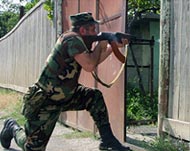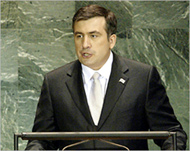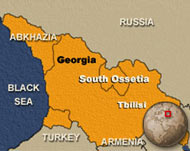Georgia-Russia ties still fraught
Frosty relations between Georgia and Russia showed no sign of thawing when Russia’s foreign minister visited the Georgian capital Tbilisi on Friday.

The visit, which was the first since the revolution that brought Georgia’s western-friendly government to power in late 2003, was already looking troubled before Foreign Minister Sergei Lavrov had even arrived in Georgia.
Lavrov’s visit was downgraded from an official affair to a working visit by Georgian officials after Lavrov refused to lay a wreath at a memorial to Georgians killed fighting against the Moscow-backed breakaway region of Abkhazia.
Lavrov was in talks with Georgian officials due to end in a meeting with President Mikhail Saakashvili on Friday evening.
“The negotiations are being held in a constructive atmosphere,” Lavrov’s spokesman Alexander Yakovenko said after Lavrov met Georgian Foreign Minister Salome Zurabishvili. Details of the talks were not disclosed.
Troubled relations
The diplomatic spat over the laying of wreaths was indicative of deep-rooted issues that plague relations between the two countries.
Russia keeps four Soviet-era military bases in Georgia, and Tbilisi is demanding that these centres are closed and Russian troops leave Georgia. Russia also backs the breakaway regions of Abkhazia and South Ossetia with funding and arms. Saakashvili is determined to return all areas of Georgia to Tbilisi’s control.
 |
|
Russia supports the breakaway |
“The conflict zones, where the annexation of Georgian territories is effectively taking place, and Russia’s military bases are among the problematic issues Russia has been using to put political pressure on Georgia,” Konstantin Gabashvili, chairman of the Georgian parliamentary committee for international relations, said on Friday.
Putting pressure on Georgia is the wrong policy, and “it will not change anything for Russia now,” Gabashvili was quoted by Interfax as saying.
Moscow on the other hand accuses Georgia of allowing Chechen rebels to cross Georgia’s northern border with Russia.
Russian bases
In a move aimed at accelerating the closure of Russian military bases in Georgia, Tbilisi has proposed one of the Russian bases be turned into a joint anti-terrorism centre.
However, according to Robert Parsons, director of the Georgian service at Radio Free Europe, Russia is trying to manipulate this offer and use it as a justification to keep all their bases in Georgia.
 |
|
Saakashvili wants to impose |
“Georgia has proposed a face-saving formula for Russia. The Russians are trying to turn that on their head and turn all bases in to anti-terror bases,” he told Aljazeera.net.
“The Russians are trying to maintain the status quo. The purpose of the anti-terror base proposal is not to maintain the status quo,” he said.
Under an agreement made in Istanbul in 1999, Russia must withdraw its troops from Georgia. Tbilisi wanted the pull-out to have happened within three years of the pact, Russia says it will close the bases within 11 years.
Bad intentions?
Russian support for the regions of Abkhazia and South Ossetia causes many Georgians to question Russia’s intentions with its smaller neighbour.
While they are officially a peacekeeping deployment, the Russian force in South Ossetia is seen by many Georgians as being partial to the South Ossetian side.
 |
|
Moscow says Georgia allows |
Russian troops are accused of arming the South Ossetian side, and analysts say the majority of Russian troops in the deployment are of North Ossetian origin. North Ossetians and South Ossetians are of the same ethnicity but are separated by the Russian-Georgian border.
The Abkhazian issue is also a major grievance for Georgia. The 1992-1993 separatist war killed thousands and about 300,000 Georgians were displaced from their homes in Abkhazia. Many of these refugees still live in squalor in Soviet-era hotels and government offices in Georgian cities. Abkhazia was armed by Russia, and Moscow gives Russian passports to Abkhazians and South Ossetians.
Under US influence
Saakashvili’s government has close relations with Washington and wants to join Nato, something that irks Moscow.
“Logically you would think that it would be in the interests of both Georgia and Russia to have good relations. You would have thought it would not be in the interest of the Russians to push Georgia toward the US, but that’s exactly what they are doing,” Parsons said.
“The US is the only buffer they [Georgians] can use against the Russians. They [the Georgians] are desperate to have a good relationship with Russia. The Russians are having huge problem accepting that the Soviet era is over and Georgia is now an independent state,” he said.